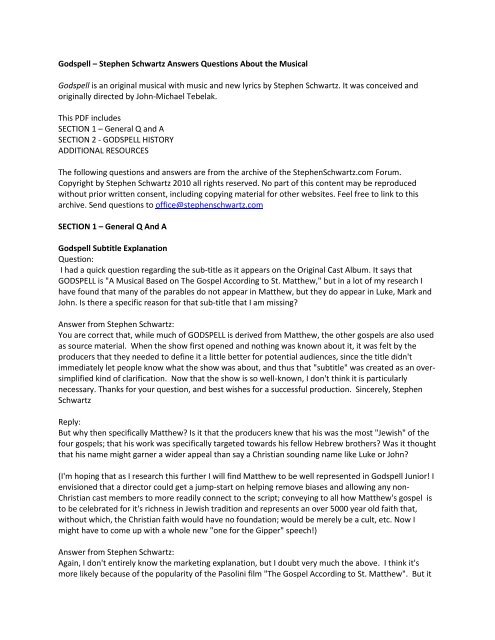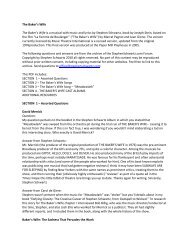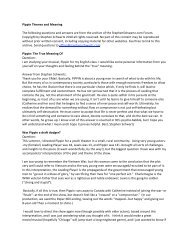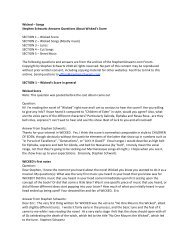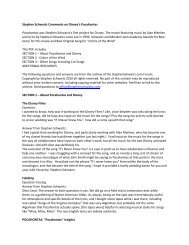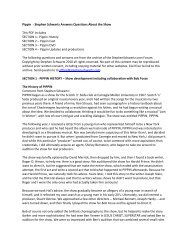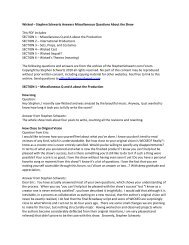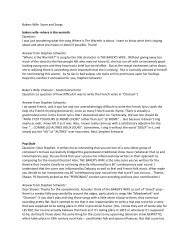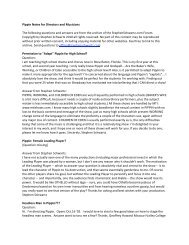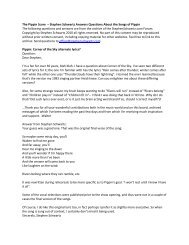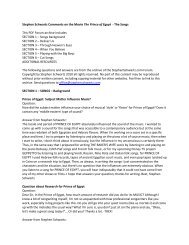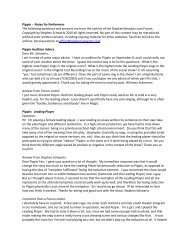Godspell â Stephen Schwartz Answers Questions About the Musical ...
Godspell â Stephen Schwartz Answers Questions About the Musical ...
Godspell â Stephen Schwartz Answers Questions About the Musical ...
You also want an ePaper? Increase the reach of your titles
YUMPU automatically turns print PDFs into web optimized ePapers that Google loves.
<strong>Godspell</strong> – <strong>Stephen</strong> <strong>Schwartz</strong> <strong>Answers</strong> <strong>Questions</strong> <strong>About</strong> <strong>the</strong> <strong>Musical</strong><br />
<strong>Godspell</strong> is an original musical with music and new lyrics by <strong>Stephen</strong> <strong>Schwartz</strong>. It was conceived and<br />
originally directed by John-Michael Tebelak.<br />
This PDF includes<br />
SECTION 1 – General Q and A<br />
SECTION 2 - GODSPELL HISTORY<br />
ADDITIONAL RESOURCES<br />
The following questions and answers are from <strong>the</strong> archive of <strong>the</strong> <strong>Stephen</strong><strong>Schwartz</strong>.com Forum.<br />
Copyright by <strong>Stephen</strong> <strong>Schwartz</strong> 2010 all rights reserved. No part of this content may be reproduced<br />
without prior written consent, including copying material for o<strong>the</strong>r websites. Feel free to link to this<br />
archive. Send questions to office@stephenschwartz.com<br />
SECTION 1 – General Q And A<br />
<strong>Godspell</strong> Subtitle Explanation<br />
Question:<br />
I had a quick question regarding <strong>the</strong> sub-title as it appears on <strong>the</strong> Original Cast Album. It says that<br />
GODSPELL is "A <strong>Musical</strong> Based on The Gospel According to St. Mat<strong>the</strong>w," but in a lot of my research I<br />
have found that many of <strong>the</strong> parables do not appear in Mat<strong>the</strong>w, but <strong>the</strong>y do appear in Luke, Mark and<br />
John. Is <strong>the</strong>re a specific reason for that sub-title that I am missing?<br />
Answer from <strong>Stephen</strong> <strong>Schwartz</strong>:<br />
You are correct that, while much of GODSPELL is derived from Mat<strong>the</strong>w, <strong>the</strong> o<strong>the</strong>r gospels are also used<br />
as source material. When <strong>the</strong> show first opened and nothing was known about it, it was felt by <strong>the</strong><br />
producers that <strong>the</strong>y needed to define it a little better for potential audiences, since <strong>the</strong> title didn't<br />
immediately let people know what <strong>the</strong> show was about, and thus that "subtitle" was created as an oversimplified<br />
kind of clarification. Now that <strong>the</strong> show is so well-known, I don't think it is particularly<br />
necessary. Thanks for your question, and best wishes for a successful production. Sincerely, <strong>Stephen</strong><br />
<strong>Schwartz</strong><br />
Reply:<br />
But why <strong>the</strong>n specifically Mat<strong>the</strong>w? Is it that <strong>the</strong> producers knew that his was <strong>the</strong> most "Jewish" of <strong>the</strong><br />
four gospels; that his work was specifically targeted towards his fellow Hebrew bro<strong>the</strong>rs? Was it thought<br />
that his name might garner a wider appeal than say a Christian sounding name like Luke or John?<br />
(I'm hoping that as I research this fur<strong>the</strong>r I will find Mat<strong>the</strong>w to be well represented in <strong>Godspell</strong> Junior! I<br />
envisioned that a director could get a jump-start on helping remove biases and allowing any non-<br />
Christian cast members to more readily connect to <strong>the</strong> script; conveying to all how Mat<strong>the</strong>w's gospel is<br />
to be celebrated for it's richness in Jewish tradition and represents an over 5000 year old faith that,<br />
without which, <strong>the</strong> Christian faith would have no foundation; would be merely be a cult, etc. Now I<br />
might have to come up with a whole new "one for <strong>the</strong> Gipper" speech!)<br />
Answer from <strong>Stephen</strong> <strong>Schwartz</strong>:<br />
Again, I don't entirely know <strong>the</strong> marketing explanation, but I doubt very much <strong>the</strong> above. I think it's<br />
more likely because of <strong>the</strong> popularity of <strong>the</strong> Pasolini film "The Gospel According to St. Mat<strong>the</strong>w". But it
wasn't particularly calculated, as far as I remember. I think <strong>the</strong>y just thought that since <strong>the</strong> bulk of <strong>the</strong><br />
show was from St. Mat<strong>the</strong>w, that was <strong>the</strong> most efficient way to describe it. As I said, I think <strong>the</strong> show is<br />
so well-known now that <strong>the</strong> use of an explanatory subtitle is unnecessary. Sincerely, <strong>Stephen</strong> <strong>Schwartz</strong><br />
Philosophy of <strong>Godspell</strong> and Jesus<br />
Question:<br />
I was also wondering if after working on this project it changed your perceptions of <strong>the</strong> person of Jesus<br />
at all? We understand that this musical is not primarily about Jesus but about community, yet because<br />
Jesus is <strong>the</strong> subject at hand and is portrayed in such an unusual way, I would be keen to know whe<strong>the</strong>r<br />
this altered your original perception of him, if indeed you had any perceptions of him at all.<br />
Answer from <strong>Stephen</strong> <strong>Schwartz</strong>:<br />
Well, to be honest, I didn't have much perception of what he actually said (at least as reported in <strong>the</strong><br />
Gospels.) I of course knew <strong>the</strong> "story", in terms of his birth and <strong>the</strong>n his death and <strong>the</strong> belief of some in<br />
his resurrection, but I didn't really know anything about him in between and what his actual teachings<br />
and philosophy were (it seems listening to a lot of current American so-called Christian leaders, <strong>the</strong>y<br />
don't ei<strong>the</strong>r.) It has indeed changed my perception of him, and of my way of trying to deal with o<strong>the</strong>r<br />
people.<br />
Basically, as I learned from GODSPELL, he said two major things: "Always treat o<strong>the</strong>rs as you would have<br />
<strong>the</strong>m treat you," and "Anything you do for one of your fellow men, however humble, you do for me."<br />
Would that everyone who professes to believe in Jesus would simply do those two things. Thanks for<br />
your interest; I hope <strong>the</strong>se answers are satisfactory to you. Sincerely, <strong>Stephen</strong> <strong>Schwartz</strong><br />
<strong>Godspell</strong>: Vatican II and Anti-Semitism<br />
Question:<br />
Compared with o<strong>the</strong>r passion plays, <strong>Godspell</strong> is far ahead of its time concerning <strong>the</strong> treatment of Jews<br />
and Judaism. Even though it draws on <strong>the</strong> gospel of Mat<strong>the</strong>w, it does not include certain invective from<br />
Mat<strong>the</strong>w that have traditionally appeared in passion plays. Can you advise me as to why? Was <strong>Stephen</strong><br />
<strong>Schwartz</strong> aware of <strong>the</strong> Vatican II document, Nostre Aetate (early 1960s), which declared an end to<br />
centuries of Roman Catholic hostility to Jews and Judaism? Was <strong>the</strong>re some o<strong>the</strong>r influence? I am<br />
preparing a presentation and would be grateful to receive any references, written or oral, that might<br />
help me with my questions. Thank you.<br />
Answer from <strong>Stephen</strong> <strong>Schwartz</strong>:<br />
Thank you for your interesting letter. As someone whose ethnic background is Jewish, I was aware of<br />
course of <strong>the</strong> Church's gradual turning away from anti-Semitism, including <strong>the</strong> Vatican II's liberalization.<br />
But I must say honestly, I didn't have any intention of dealing with that issue in GODSPELL, nor I am sure,<br />
did <strong>the</strong> conceiver and adapter, John-Michael Tebelak. O<strong>the</strong>r than acknowledging that Jesus and his<br />
disciples were practicing Jews by including some of <strong>the</strong> traditional Passover ceremony in <strong>the</strong> Last Supper<br />
sequence, I am not aware of anywhere in <strong>the</strong> show where we touch on <strong>the</strong> issue of Judaism or of anti-<br />
Semitism. Of course in <strong>the</strong> sense that GODSPELL is about <strong>the</strong> formation of a community and <strong>the</strong><br />
inclusivity of all types of people within it (something that is sadly lacking in much of today's so-called<br />
"Christian" rhetoric), I suppose it could be viewed as a plea for tolerance. Thank you again for writing<br />
and for raising such an interesting issue. Sincerely, <strong>Stephen</strong> <strong>Schwartz</strong><br />
<strong>Godspell</strong>: Superman T-Shirt<br />
Question:
[Someone asks about <strong>the</strong> superman shirt origins]<br />
Answer from <strong>Stephen</strong> <strong>Schwartz</strong>:<br />
That was Jesus' costume in <strong>the</strong> original, as conceived by John-Michael Tebelak and designed by costume<br />
designer Susan Tsu. I never asked whe<strong>the</strong>r it was John-Michael's idea or Susan's, but <strong>the</strong> Superman shirt<br />
was always his costume. I've seen many productions since, of course, where he wears o<strong>the</strong>r things. But<br />
<strong>the</strong> slightly comic self-awareness of <strong>the</strong> Superman shirt, plus its colorful nature, still make it seem to me<br />
<strong>the</strong> most successful of <strong>the</strong> Jesus costumes I've seen. Sincerely, <strong>Stephen</strong> <strong>Schwartz</strong><br />
<strong>Godspell</strong> Sermon on <strong>the</strong> Mount<br />
Question:<br />
Mr. <strong>Schwartz</strong>; I've been a fan of your show GODSPELL for years. I hope to be in it, someday. However,<br />
something puzzles me about <strong>the</strong> Sermon On The Mount scene: Robin: "Blessed are <strong>the</strong>..." yadda, yadda,<br />
yadda. You know, this scene. Right before All For The Best. My question is about Judas' line. What<br />
exactly is he saying? "BLESSED ARE YE!! When men shall revile YOU and defile YOU. And say all<br />
(something) of evil against YOU! [slight pause] ... Falsely..." What? He seems really angry at Jesus and it<br />
comes out of nowhere. Jesus, instead of answering Judas, changes <strong>the</strong> subject to reading feet. In <strong>the</strong><br />
past, I've argued that this is Judas' way of foreshadowing <strong>the</strong> betrayal. But I think I'm wrong on that.<br />
Can you please help me out? Thanks in advance, Andy.<br />
Answer from Carol de Giere:<br />
Dear Andy, I thought you might like some background on this. John-Michael Tebelak, who developed <strong>the</strong><br />
concept and initial script of GODSPELL, was drawing from Bible passages, including this one from<br />
Mat<strong>the</strong>w 5:11: "Blessed are ye, when men shall revile you, and persecute you, and shall say all manner<br />
of evil against you falsely, for my sake." (I just looked it up on Bible.com using <strong>the</strong> King James version,<br />
which is, I believe, what Tebelak used.)<br />
When <strong>the</strong> show was developed at Carnegie Mellon (before <strong>Schwartz</strong> came on board to write music), <strong>the</strong><br />
cast members used <strong>the</strong> clips Tebelak brought in and developed playful ways to convey <strong>the</strong> parables and<br />
passages. This was extended when <strong>the</strong> show went to New York. So this part of <strong>the</strong> script actually doesn't<br />
have much to do with <strong>Stephen</strong>. He was hired to write <strong>the</strong> songs.<br />
Changes<br />
Question:<br />
hey, i'm a huge fan of godspell and have seen it in various venues about 50 times. my mo<strong>the</strong>r is what<br />
one might call a 'godspell-fanatic' and has traveled to 6 states and has seen it 150+ times. growing up<br />
with <strong>the</strong> original godspell album playing all <strong>the</strong> time is something my bro<strong>the</strong>r and i cherish to this day.<br />
(and now that i own <strong>the</strong> DVD, well, don't get me started!)<br />
my question - i know times change and things in <strong>the</strong> world must change with <strong>the</strong> times, as you have<br />
updated godspell again and again but <strong>the</strong>re was something so special about <strong>the</strong> original godspell that, in<br />
my opinion, cannot be matched. will <strong>the</strong> original ever be performed again? thanks for your time!<br />
Answer from <strong>Stephen</strong> <strong>Schwartz</strong>:<br />
Thanks for your question and your enthusiasm for GODSPELL. Actually, <strong>the</strong> script of GODSPELL has not<br />
been updated. In preparing <strong>the</strong> show for licensing, I added director's guidelines for people doing <strong>the</strong><br />
show who were not familiar with <strong>the</strong> original, but nothing in <strong>the</strong> script itself was changed. It's <strong>the</strong><br />
nature of <strong>the</strong> show that each director and his/her cast, musical director, and design staff arrive at <strong>the</strong>ir
own take on it, so it may seem as if it is constantly being updated. But, o<strong>the</strong>r than <strong>the</strong> new song<br />
"Beautiful City" being available for inclusion in <strong>the</strong> show if <strong>the</strong> director so chooses, <strong>the</strong> show remains as<br />
it always was. Sincerely, <strong>Stephen</strong> <strong>Schwartz</strong><br />
<strong>Godspell</strong> influence<br />
Question:<br />
I was also wondering if after working on this project it changed your perceptions of <strong>the</strong> person of Jesus<br />
at all? We understand that this musical is not primarily about Jesus but about community, yet because<br />
Jesus is <strong>the</strong> subject at hand and is portrayed in such an unusual way, I would be keen to know whe<strong>the</strong>r<br />
this altered your original perception of him, if indeed you had any perceptions of him at all.<br />
Answer from <strong>Stephen</strong> <strong>Schwartz</strong>:<br />
Well, to be honest, I didn't have much perception of what he actually said (at least as reported in <strong>the</strong><br />
Gospels. ) I of course knew <strong>the</strong> "story", in terms of his birth and <strong>the</strong>n his death and <strong>the</strong> belief of some in<br />
his resurrection, but I didn't really know anything about him in between and what his actual teachings<br />
and philosophy were (it seems listening to a lot of current American so-called Christian leaders, <strong>the</strong>y<br />
don't ei<strong>the</strong>r.) It has indeed changed my perception of him, and of my way of trying to deal with o<strong>the</strong>r<br />
people. Basically, as I learned from GODSPELL, he said two major things: "Always treat o<strong>the</strong>rs as you<br />
would have <strong>the</strong>m treat you," and "Anything you do for one of your fellow men, however humble, you do<br />
for me." Would that everyone who professes to believe in Jesus would simply do those two things.<br />
SECTION 2 - GODSPELL HISTORY<br />
<strong>Godspell</strong>: Changes from La Mama to Cherry Lane<br />
Question:<br />
I've read that "<strong>Godspell</strong>" began as an experimental piece at La MaMa before moving to <strong>the</strong> Cherry Lane<br />
<strong>the</strong>ater. Aside from <strong>the</strong> fact that a complete musical score was added to it, what were some o<strong>the</strong>r major<br />
changes that <strong>the</strong> show underwent?<br />
Answer from <strong>Stephen</strong> <strong>Schwartz</strong>:<br />
GODSPELL actually went through very few changes between LaMama and <strong>the</strong> Cherry Lane, o<strong>the</strong>r than<br />
<strong>the</strong> obvious addition of <strong>the</strong> new songs and <strong>the</strong> musical staging that went with <strong>the</strong>m. We shortened it<br />
slightly (<strong>the</strong> Parable of <strong>the</strong> Talents, which used to be in <strong>the</strong> second act, was cut, for instance) and<br />
changed a couple of cast members to get a (slightly) stronger singing ensemble. But basically <strong>the</strong> show<br />
already worked well at LaMama, and so very few changes were incorporated. Best, <strong>Stephen</strong> <strong>Schwartz</strong><br />
<strong>Godspell</strong> Meant to Mock Christianity?<br />
Hey gang...<strong>Stephen</strong> asked me to post this. Enjoy. Michael<br />
Dear Mr. <strong>Schwartz</strong>,<br />
This past weekend, I saw <strong>the</strong> play <strong>Godspell</strong> for <strong>the</strong> second time. The first time was in <strong>the</strong> 1970's in NY. I<br />
loved it both times. However, <strong>the</strong>re seems to be some discussion about <strong>the</strong> intent of <strong>the</strong> play. One of<br />
<strong>the</strong> members in my family felt that it was written to mock Christianity and felt it was a total joke. I've<br />
always walked away and felt that <strong>the</strong> play was very true to <strong>the</strong> Gospel of Mat<strong>the</strong>w but just presented in<br />
an unconventional and unorthodox manner but none <strong>the</strong> less it was giving glory to God. Can you please<br />
let me know? Thanks so much for sharing your beautiful musical talent....<br />
Answer from <strong>Stephen</strong> <strong>Schwartz</strong>:
Your family member could not possibly be more mistaken. GODSPELL was conceived by John-Michael<br />
Tebelak, who was combining his interests in <strong>the</strong>atre and his calling to become an Episcopal minister.<br />
John-Michael ultimately spent a great deal of time before he died working at <strong>the</strong> Ca<strong>the</strong>dral of St. John<br />
<strong>the</strong> Divine in New York City. In addition, he based his conception of GODSPELL on <strong>the</strong> work and<br />
teachings of Harvey Cox, <strong>the</strong> famous professor of Divinity at Harvard. Clearly, this is not a work intended<br />
to "mock" Christianity. GODSPELL has been performed before countless members of Christian orders<br />
and denominations, including (at <strong>the</strong>ir invitation) two Popes; again, a work that was intended to "mock"<br />
Christianity would hardly have been so enthusiastically greeted by people who have made Christianity<br />
<strong>the</strong>ir life's work. What GODSPELL does do is find humor in <strong>the</strong> Gospels and in <strong>the</strong> responses of human<br />
beings to <strong>the</strong>m. The show was conceived by John-Michael partly as a response to <strong>the</strong> humorlessness,<br />
joylessness, and narrow-mindedness he found in many organized Christian congregations. Sad to say,<br />
<strong>the</strong>se traits seem only to have grown stronger, along with a new ugly strain of bigotry, in many<br />
American so-called Christians. I sincerely hope for your sake this family member of yours is not among<br />
<strong>the</strong>m. In any event, I hope this response has given you some ammunition for any discussion you may be<br />
having with <strong>the</strong>m, and I thank you both for your enthusiasm for GODSPELL and for taking <strong>the</strong> time to<br />
write to me. Yours most sincerely, <strong>Stephen</strong> <strong>Schwartz</strong><br />
Comment from Tom Peters:<br />
The Harvey Cox "Feast of Fools" book which inspired Tebelak during his creation of <strong>Godspell</strong> has been<br />
out of print for a long time. After loaning (and losing) my two paperbacks copies I decided to find a<br />
hardcover copy. I was able to buy a new copy directly from <strong>the</strong> Harvard Divinty School bookstore. Even<br />
though it was out of print, <strong>the</strong>y still copies available. This was a few years back, but I believe this is your<br />
best chance of finding a copy of this book. If you ever direct GODSPELL this book goes straight to <strong>the</strong><br />
heart of <strong>the</strong> play. You have to buy <strong>the</strong> book just to see its bright orange day-glo end papers. One look at<br />
<strong>the</strong> inside of <strong>the</strong> book and you'll know instantly that it was published in 1969!<br />
Original Performance Site of <strong>Godspell</strong><br />
Question missing<br />
Answer from <strong>Stephen</strong> <strong>Schwartz</strong>:<br />
GODSPELL began as a directing project of John-Michael Tebelak at Carnegie Mellon University in 1969 or<br />
1970. So it was first performed in <strong>the</strong> Carnegie Mellon studio <strong>the</strong>atre. A production was subsequently<br />
performed at <strong>the</strong> Cafe La Mama, an off-off-Broadway <strong>the</strong>atre in New York City, in February and March<br />
of 1971. This is where I first saw <strong>the</strong> show. The first production that included my music and new lyrics<br />
opened at <strong>the</strong> Cherry Lane Theatre in New York City on May 17, 1971 (after three prevues). Sincerely,<br />
<strong>Stephen</strong> <strong>Schwartz</strong><br />
<strong>Godspell</strong> History/Day By Day Information<br />
GODSPELL began at Carnegie-Mellon University as a directing project for John-Michael Tebelak, who was<br />
in <strong>the</strong> <strong>the</strong>atre department <strong>the</strong>re. John-Michael, who had thoughts of becoming an Episcopal minister<br />
before he decided to become a <strong>the</strong>atre director, had recently attended an Easter service in Pittsburgh<br />
and was struck by <strong>the</strong> lack of joy and celebration in <strong>the</strong> service as well as by <strong>the</strong> personal hostility he felt<br />
from some of his fellow churchgoers because of his youth and long hair (it was during <strong>the</strong> height of <strong>the</strong><br />
Vietnam War and its accompanying "Generation Gap".) The show was presented at Carnegie, where it<br />
included interpolated pop songs and Episcopal hymns set to music written by cast members, as well as<br />
<strong>the</strong> song "By My Side", written by CMU students Jay Hamburger and Peggy Gordon (a member of <strong>the</strong><br />
cast). Being very well-received, it was presented <strong>the</strong> following year in New York City at an off-off-<br />
Broadway <strong>the</strong>atre called <strong>the</strong> Cafe la Mama. This was in February and March of 1971. There it was seen
y producers Edgar Lansbury and Joseph Beruh (brought <strong>the</strong>re by former CMU student Charles Haid,<br />
who became <strong>the</strong> associate producer of <strong>the</strong> show). They became interested in giving <strong>the</strong> show a<br />
commercial production at an off-Broadway <strong>the</strong>atre. At that time, I was contacted by <strong>the</strong> producers, who<br />
had heard me audition my score for PIPPIN, and I signed on to write music and new lyrics. We retained<br />
<strong>the</strong> song "By My Side" and <strong>the</strong> rest of <strong>the</strong> score was written in time for <strong>the</strong> start of rehearsals on April<br />
11, 1971, except for <strong>the</strong> song "Learn Your Lessons Well" which was added during rehearsals. The show<br />
opened May 17, 1971.<br />
"Day By Day" was written in March of 1971 as I hurried to come up with a new score for GODSPELL, <strong>the</strong><br />
musical I had seen Off-Off-Broadway at Cafe La Mama a few weeks before. It was due to go into<br />
rehearsal in April for an Off-Broadway opening in May. Of course I was too young and stupid to know it<br />
couldn't be done that fast! The show of course was <strong>the</strong> brain child of John-Michael Tebelak of <strong>the</strong><br />
Carnegie Drama Department and he had developed it at school with many of <strong>the</strong> same students who<br />
now comprised <strong>the</strong> cast. None of us anticipated <strong>the</strong> overwhelming response to <strong>the</strong> show and it's<br />
amazing success, nor that of "Day By Day," which was a re-setting of an Episcopal hymn first written in<br />
<strong>the</strong> Thirteenth century. I think <strong>the</strong> song probably caught on so strongly because of its simplicity and<br />
repetitiveness. (I remember <strong>the</strong> publishers telling me before it was recorded that I should write more<br />
lyrics to make it more commercial, and I just looked at <strong>the</strong>m helplessly and said, "But that's all <strong>the</strong> words<br />
<strong>the</strong>re are." In any case, "Day By Day" has remained, over a quarter of a century, one of my best known<br />
and most often performed songs.<br />
GODSPELL History – Quotable commentary<br />
<strong>Stephen</strong> <strong>Schwartz</strong> had his first encounter with GODSPELL on March 7, 1971 at <strong>the</strong> Cafe© LaMama offoff-Broadway.<br />
<strong>Stephen</strong> <strong>Schwartz</strong>: It was a pretty shaky time in my life. I had been musical director of a show that had<br />
just flopped and I had just lost my job at RCA Records. I got a call from Charlie Haid, whom I had known<br />
at college; he was working with two producers, Edgar Lansbury and Joe Beruh, who had heard me<br />
audition <strong>the</strong> score for PIPPIN. He told me <strong>the</strong>y were thinking of moving a show called GODSPELL from<br />
LaMama to Off-Broadway and asked if I would be interested in writing a score for it. I went to see it that<br />
night. I remember <strong>the</strong> energy and freshness and being astonished that John-Michael Tebelak, <strong>the</strong><br />
conceiver/director, had discovered so much humor in material which I had always seen treated with<br />
ponderous solemnity. Above all, I remember feeling <strong>the</strong> joy I shared with <strong>the</strong> o<strong>the</strong>r members of <strong>the</strong> tiny<br />
audience. Five weeks later, we went back into rehearsal with my score (and one song we retained from<br />
<strong>the</strong> LaMama production, <strong>the</strong> lovely By My Side.) The rehearsal period was intense and strenuous,<br />
though full of laughter, and <strong>the</strong>re was a kind of focus that I didn't know <strong>the</strong>n was unusual. We did not<br />
think at all past opening night, about things like hit or flop, reviews and ticket sales. There was no<br />
second-guessing. I remember late in previews, one of <strong>the</strong> cast members saying with wonder, Do you<br />
realize critics are going to write about us? And all of us looking at him with astonishment. It had never<br />
really entered our minds. I know <strong>the</strong>re was a sort of innocence and purity about that experience which I<br />
spent too long trying to find again. But GODSPELL will always be a special show for me, and that spring<br />
of 1971 a special time.<br />
<strong>Godspell</strong> Q & A<br />
Question:
What were your first impressions of <strong>the</strong> show at <strong>the</strong> La Mama <strong>the</strong>ater?<br />
Answer from <strong>Stephen</strong> <strong>Schwartz</strong>:<br />
My first impression of GODSPELL when I saw it at LaMama on Sunday, March 7, 1971, was that it was<br />
messy but inspired.<br />
Question:<br />
I've read that you wrote <strong>the</strong> score in five weeks. How did you get inspired to write fourteen songs in that<br />
short period of time? Were <strong>the</strong>re some songs that never made <strong>the</strong> show?<br />
Answer from <strong>Stephen</strong> <strong>Schwartz</strong>:<br />
It was partly BECAUSE I had seen <strong>the</strong> show and <strong>the</strong>refore understood what it was and what <strong>the</strong> music<br />
needed to do that I was able to write <strong>the</strong> score so quickly. The o<strong>the</strong>r reason is because so many of <strong>the</strong><br />
lyrics were derived from <strong>the</strong> Episcopal hymnal (and selected by John-Michael), and lyrics take me much<br />
longer to write than music. There were no songs written for <strong>the</strong> show that were not used. "Learn Your<br />
Lessons Well" was written in rehearsal when we felt <strong>the</strong>re was too long a time in Act One without music<br />
and because Gilmer didn't have a song.<br />
Question:<br />
I also read somewhere that <strong>the</strong> Prologue was your idea. Is this true? How did you go about choosing<br />
which philosophers to be represented?<br />
Answer from <strong>Stephen</strong> <strong>Schwartz</strong>:<br />
The Prologue was in <strong>the</strong> show at LaMama. I simply musicalized it. The specific philosophers and what<br />
<strong>the</strong>y said had been selected by John-Michael.<br />
Question:<br />
There were some cast changes after La Mama and before Cherry Lane. Was this based on acting or<br />
singing ability (or something else)?<br />
Answer from <strong>Stephen</strong> <strong>Schwartz</strong>:<br />
We made two cast changes, one male and one female, in order to get a slightly stronger singing<br />
ensemble. Lamar Alford and Joanne Jonas were added to boost <strong>the</strong> vocal sound.<br />
Question:<br />
Also, even <strong>the</strong> Cherry Lane cast was not made up of professionals. Did you ever feel like some of <strong>the</strong>m<br />
wouldn't be able to carry off <strong>the</strong> music?<br />
Answer from <strong>Stephen</strong> <strong>Schwartz</strong>:<br />
It did not worry me at all that <strong>the</strong> cast was "non-professional" as I wasn't particularly professional myself<br />
at that point. Plus, having seen <strong>the</strong> LaMama show, I knew how good <strong>the</strong>y were.<br />
Question:<br />
This is a very broad question: What were your feelings about <strong>the</strong> musical as a whole? I read somewhere<br />
that you never saw <strong>Godspell</strong> as a religious musical but more of a show about community.<br />
Answer from <strong>Stephen</strong> <strong>Schwartz</strong>:
Your information is correct. GODSPELL is essentially a show about <strong>the</strong> formation of a community, not<br />
about religion, at least in my view, and it was always on that basis that we rehearsed it.<br />
Question:<br />
I don't know much about Mr. Tebelak, but how would you describe him as a person? He seemed to back<br />
an impact on <strong>the</strong> era at a very young age. Also in photos, he seems very shy.<br />
Answer from <strong>Stephen</strong> <strong>Schwartz</strong>:<br />
John-Michael was somewhat shy, as you imagine, but he could also be gregarious and occasionally even<br />
grand. Like any genius, he had his own particular and peculiar way of looking at things. He was quite a<br />
large man physically and so he could be somewhat overwhelming, but his basic soul was very gentle.<br />
Question:<br />
I don't know if you can answer this, but <strong>the</strong> lyrics to Peggy Gordon's "By My Side" are different in <strong>the</strong><br />
movie. She sings "By Your Side" in <strong>the</strong> show while Katie Hanley sings "By My Side". Did she change this<br />
and for what reason? Staging?<br />
Answer from <strong>Stephen</strong> <strong>Schwartz</strong>:<br />
I don't know exactly when or why <strong>the</strong> "By My Side" lyrics got transposed for <strong>the</strong> movie. I think <strong>the</strong>y were<br />
sung that way in <strong>the</strong> show, at least eventually. I don't recall <strong>the</strong>re being a conscious decision to change<br />
"my" to "your".<br />
Question:<br />
Finally (this is just out of curiosity), my original cast album is dated 1974. It has <strong>the</strong> original cast from <strong>the</strong><br />
Cherry Lane Theater, yet 1974, <strong>the</strong> cast was different and <strong>the</strong> show was playing at <strong>the</strong> Promenade. Is<br />
this just a release date for Arista records? I know that Bell Records was publishing <strong>the</strong> album before<br />
<strong>the</strong>m. Also, why isn't <strong>the</strong> Prologue placed on <strong>the</strong> original album? Is it available with <strong>the</strong> original cast?<br />
Answer from <strong>Stephen</strong> <strong>Schwartz</strong>:<br />
I have no idea why <strong>the</strong> date on <strong>the</strong> album is 1974, since it was recorded in 1971. '74 may be <strong>the</strong> date<br />
Bell Records was taken over by Arista. The Prologue was not recorded because we wanted to make it an<br />
album with pop cross-over potential, and I felt starting with <strong>the</strong> long piano-only and essentially<br />
<strong>the</strong>atrical Prologue would hurt that. Whe<strong>the</strong>r or not I was right, <strong>the</strong> album as you know did become a<br />
significant cross-over hit. The only recording of <strong>the</strong> Prologue I know of is on <strong>the</strong> recent London album on<br />
TER Records.<br />
<strong>Godspell</strong> <strong>Questions</strong><br />
Question:<br />
My understanding is that you first became involved when Joe Beruh brought you down to see it in its La<br />
Mama incarnation. Is that true?<br />
Answer from <strong>Stephen</strong> <strong>Schwartz</strong>:<br />
That is correct. It was actually Charlie Haid (<strong>the</strong> associate producer) who called me on Joe and Edgar<br />
Lansbury's behalf, and I went to see it at LaMama (on March 7, 1971, <strong>the</strong> last performance <strong>the</strong>re.) I met<br />
with Joe and Edgar <strong>the</strong> following week and agreed to write a score for an off-Broadway production, and<br />
we went into rehearsal five weeks later (!)<br />
Why do shows transfer?
Question:<br />
Not knowing much about <strong>the</strong> business of show business, I was wondering why <strong>Godspell</strong> moved from <strong>the</strong><br />
Broadhurst, to <strong>the</strong> Plymouth, to <strong>the</strong> Ambassador? I guess I always assumed that a show that was selling<br />
out consistently might transfer to a house with a larger capacity, or vice-versa for a show with waning<br />
attendance, but those three houses are all roughly <strong>the</strong> same size. Is <strong>the</strong>re a juicy (albeit 28-year-old)<br />
story here?<br />
Answer from <strong>Stephen</strong> <strong>Schwartz</strong>:<br />
Dear P: When GODSPELL moved to Broadway originally, it had already run about five or six years off-<br />
Broadway, so it was clearly nearing <strong>the</strong> end of its run (those were not yet <strong>the</strong> days of <strong>the</strong> ten-years-andcounting<br />
runs of hit musicals.) The Broadway transfer was an economic decision made by <strong>the</strong><br />
producers to capitalize on <strong>the</strong> strong weekend business <strong>the</strong> show was still doing. I assume that <strong>the</strong><br />
reason GODSPELL <strong>the</strong>n transferred between Broadway <strong>the</strong>atres is that <strong>the</strong> <strong>the</strong>atres <strong>the</strong> show was<br />
playing in became booked for new incoming shoes and <strong>the</strong> Shubert organization, which owns all three of<br />
those <strong>the</strong>atres, wanted <strong>the</strong>m available for <strong>the</strong> new shows. The Broadhurst is considered a very<br />
desirable house for small or mid-size musicals, <strong>the</strong> Plymouth is considered a bit less desirable, and <strong>the</strong><br />
Ambassador has come to be seen as a house for shows ending <strong>the</strong>ir runs (CHICAGO transferred <strong>the</strong>re<br />
and is playing <strong>the</strong>re now.) Some of this has to do with <strong>the</strong>atre location and size, but some of it is just<br />
one of those strange Broadway traditions that arise in <strong>the</strong> weird insular world of musical <strong>the</strong>atre. Hope<br />
this helps to answer your question. Sincerely, <strong>Stephen</strong> <strong>Schwartz</strong><br />
John-Michael Tebelak who conceived and directed <strong>Godspell</strong><br />
Question:<br />
I don't know much about Mr. Tebelak, but how would you describe him as a person? He seemed to back<br />
an impact on <strong>the</strong> era at a very young age. Also in photos, he seems very shy.<br />
Answer from <strong>Stephen</strong> <strong>Schwartz</strong>:<br />
John-Michael was somewhat shy, as you imagine, but he could also be gregarious and occasionally even<br />
grand. Like any genius, he had his own particular and peculiar way of looking at things. He was quite a<br />
large man physically and so he could be somewhat overwhelming, but his basic soul was very gentle.<br />
Question:<br />
Could you tell me how I might reach John-Michael Tebelak?<br />
Answer from <strong>Stephen</strong> <strong>Schwartz</strong>: I regret to tell you that John-Michael Tebelak died of a heart attack<br />
several years ago. Needless to say, he was quite young and it was pretty devastating to all of us who<br />
knew him. He was an amazing talent and a wildly colorful character. Sorry to be <strong>the</strong> bearer of sad<br />
tidings. Sincerely, <strong>Stephen</strong> <strong>Schwartz</strong><br />
Lamar Alford<br />
Question:<br />
One of <strong>the</strong> most distinct things about <strong>the</strong> original cast recording of <strong>Godspell</strong> is <strong>the</strong> voice of Lamar Alford.<br />
I'm curious--what was his background? Did he go on to be in any o<strong>the</strong>r shows afterwards? His voice is<br />
ra<strong>the</strong>r different from <strong>the</strong> o<strong>the</strong>r members of <strong>the</strong> cast and is certainly unique... and very different from<br />
Merrell Jackson's performance in <strong>the</strong> film. I'm curious as to your thoughts.<br />
Answer from <strong>Stephen</strong> <strong>Schwartz</strong>:
Lamar was chosen because so few of <strong>the</strong> original cast were strong singers. We imported two people<br />
into <strong>the</strong> La Mama cast (<strong>the</strong> o<strong>the</strong>r was Joanne Jonas) to help with <strong>the</strong> singing. I'm afraid I don't know too<br />
much of what Lamar did afterwards; he was teaching in NC or SC for a while, and he died about ten<br />
years ago. Thank you for taking <strong>the</strong> time to write. All <strong>the</strong> best, <strong>Stephen</strong> <strong>Schwartz</strong><br />
Answer from a Forum visitor:<br />
Lamar Alford worked for many many years as <strong>the</strong> Artistic Director and resident dramatist for <strong>the</strong> King<br />
Players, an acting troupe based out of Morehouse College in Atlanta, GA. Some of Morehouse's more<br />
notable grads in entertainment are Spike Lee, Samuel L. Jackson and Bill Nunn. He was my acting<br />
teacher and before his death in 1991 had inspired hundred of students in <strong>the</strong> field of acting and musical<br />
<strong>the</strong>atre. Lamar was crazy/passionate about <strong>the</strong>atre and demanding of ones commitment to <strong>the</strong> craft. He<br />
was known for his long deep stares that would provoke fear and commitment from his students. He<br />
produced several plays in conjunction with Spelman College including: Martin and What Drove Molly<br />
Mad. Sadly Lamar passed in 1991. His impact on <strong>the</strong> people he touched is long lasting.<br />
<strong>Godspell</strong> Cast and Creative Team Friendly?<br />
Question missing<br />
Answer from <strong>Stephen</strong> <strong>Schwartz</strong>:<br />
The GODSPELL cast, along with myself, John-Michael Tebelak (<strong>the</strong> conceiver and director) and musical<br />
director <strong>Stephen</strong> Reinhardt were all pretty close after <strong>the</strong> show first opened. Over <strong>the</strong> years, I have<br />
pretty much fallen out of touch with <strong>the</strong>m, but I considered almost all of <strong>the</strong>m my friends, though I<br />
guess I was closest with Gilmer, Jeffrey and Robin. The personalities of <strong>the</strong> original cast were, not<br />
surprisingly, not all that far away from <strong>the</strong> characters <strong>the</strong>y created. Sincerely, <strong>Stephen</strong> <strong>Schwartz</strong><br />
<strong>Godspell</strong> Couples<br />
Question:<br />
[Someone raises a question about married couples who met doing a production of <strong>Godspell</strong>]<br />
Answer from <strong>Stephen</strong> <strong>Schwartz</strong>:<br />
Actually, yes, I have always been surprised by how many couples meet in GODSPELL and get married. It<br />
seems to me a considerably higher percentage than any of my o<strong>the</strong>r shows (though BAKER'S WIFE has<br />
spawned quite a few too.) For instance, <strong>the</strong> original musical director, <strong>Stephen</strong> Reinhardt, met his wife<br />
(Gilmer McCormick) in GODSPELL, as did later musical director, Bob Christianson. Our original Judas<br />
married one of <strong>the</strong> "Day by Day" replacement girls, and our Judas in <strong>the</strong> 1988 Lambs Theatre revival met<br />
and married <strong>the</strong> gal singing "By My Side". And <strong>the</strong> list goes on. In any event, I congratulate you and your<br />
wife and am glad to have played a small part in your getting toge<strong>the</strong>r. Thanks for letting me know.<br />
Sincerely, <strong>Stephen</strong> <strong>Schwartz</strong><br />
ADDITIONAL RESOURCES<br />
See also <strong>Stephen</strong> <strong>Schwartz</strong> on Religion questions.<br />
See also <strong>the</strong> o<strong>the</strong>r GODSPELL sections in this archive.<br />
For a complete <strong>Godspell</strong> history with photos from <strong>the</strong> original productions, read Chapters 4, 5, 6, and<br />
“<strong>Godspell</strong> Song Stories” in <strong>the</strong> authorized <strong>Stephen</strong> <strong>Schwartz</strong> biography, “Defying Gravity: The Creative<br />
Career of <strong>Stephen</strong> <strong>Schwartz</strong>, from <strong>Godspell</strong> to Wicked.” http://www.DefyingGravityTheBook.com<br />
For Broadway show data including length of run and cast, see
http://www.ibdb.com/production.php?id=3847<br />
For a choice of cast albums, sheet music, <strong>the</strong> movie DVD, and o<strong>the</strong>r information see<br />
www.musicalschwartz.com/godspell.htm


